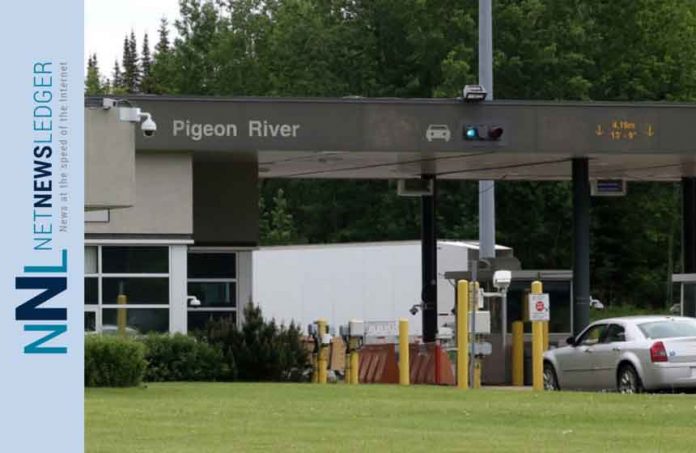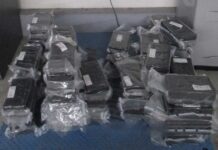THUNDER BAY – The Canada Border Services Agency (CBSA) Northern Ontario Region (NOR) today released operational and enforcement highlights covering the period from January 1 to October 31, 2022.
With its boundaries stretching from the Arctic Circle in the north, to the Manitoba border in the west, the Quebec border in the east and the outskirts of Metropolitan Toronto in the south, the NOR covers almost 3 million square kilometres.
Border management and border enforcement services are delivered at 7 land ports of entry, 2 rail crossings, 3 seasonal ports of entry, 2 marine ports of entry, over 100 marine reporting sites, 1 ferry crossing, and more than 25 airports and air reporting sites.
Welcoming travellers into Canada
While traveller volumes were lower due to the COVID-19 travel restrictions that were in place for part of the year, officers in the NOR cleared almost 3.4 million travellers and processed approximately 60 refugee claims.
- Those behind the scenes have gone above-and-beyond in support of regional operations. The region’s Corporate, Programs and Integration Management Division, which plays a key role in supporting operations, provided exceptional support to asylum seeker processing.
- In July, the CBSA resumed the Remote Area Border Crossing Program, which had been suspended as a result of the pandemic. The program facilitates customs clearance for travellers crossing the border into certain remote areas of northwestern Ontario and southeastern Manitoba. Since the resumption of the program, NOR officers have worked diligently to process more than 3,100 permits.
- With the resumption of Great Lakes cruise travel, officers from the Sault Ste. Marie port of entry cleared 45 cruise ships in both the Sault and in Little Current, welcoming thousands of travellers to our beautiful country.
Supporting the economy
The CBSA enforces laws in support of trade and commerce, and collects duties and taxes. We collect customs duties as a way to protect certain sectors of the Canadian economy.
- The CBSA also uses the Administrative Monetary Penalty System (AMPS) to issue penalties to commercial clients for violating trade and border legislation, such as failure to pay duties. In the NOR, a total of $760,600 AMPS were issued to commercial importers who violated trade and border legislation.
- This fall, the NOR created a new officer position at the Lansdowne port of entry to work on the front line to identify trends and risks related to trade compliance that affect the Canadian economy.
- The Fort Frances port of entry processed more than 2,500 trains carrying more than 104,600 loads, ensuring that the goods were accurately reported and import measures met CBSA requirements.
- Overall, officers in the NOR processed more than 237,000 commercial trucks, 102,100 commercial air shipments, 800,400 courier shipments, and released over 460,000 commercial shipments.
Protecting Canadians
Employees on the front line have demonstrated an incredible ability to adapt to change while continuing to intercept contraband and deliver a high level of client service. Some examples of how the NOR helped to protect our communities this year include the following:
- On April 27, officers in Cornwall found $150,000 USD in undeclared currency while searching a vehicle. All currency worth $10,000 CAD or more must be declared when crossing the border. The money was seized as suspected proceeds of crime.
- On April 29, and twice more in early May, a Detector Dog Services canine at the Macdonald-Cartier Ottawa International Airport indicated positively for suspected narcotics on a luggage can. The subsequent officer examinations led to the discovery of almost two kilograms of suspected cocaine.
- In early September, 46 firearms were seized following a joint investigation by CBSA NOR Intelligence and Enforcement Operations Division (IEOD) officers and law enforcement partners.
- On October 4, officers at the Rainy River port of entry noticed signs of impairment in a driver crossing the border. The individual was arrested and turned over to the Ontario Provincial Police.
- On October 7, officers at the Lansdowne (Thousand Islands) port of entry seized almost 20 grams of suspected opium found concealed in a commercial vehicle.
- Working with our law enforcement partners, NOR IEOD and officers at the Cornwall port of entry made several large tobacco and tobacco-products seizures in the first ten months of the year. These included over 550 kilograms of tobacco, approximately 340,000 contraband cigarettes, over 29,000 cigars and 52 kilograms of chewing tobacco.
- From January 1 to October 31, at NOR ports of entry there were an additional 22 firearms seized and total 529 suspected narcotics seizures. As well, over 1,400 inadmissible foreign nationals were denied entry and over 160 persons were removed from Canada.
Read more here:
CBSA investigation leads to jail time for importing and owning prohibited weapons – Canada.ca
Collaborating with Indigenous communities
In September 2022, leaders from the Mohawk Council of Akwesasne and CBSA, including new CBSA President O’Gorman and CBSA Champion for Indigenous Peoples, Vice-President Millar, met in Akwesasne to agree on the direction the Border Collaboration Initiative would take in the coming months and years. This resulted in a new Joint Work Plan and created the Cornwall port of entry Working Circle, the Dundee port of entry Working Circle and the Preclearance Working Circle. The Joint Work Plan and new working circles were finalized in Rigaud, QC.
On September 30, 2022, the Northern Ontario Region marked the National Day for Truth and Reconciliation. Employees across the region showed their support for Residential School Survivors, their families, and communities by participating in a moment of silence. An artwork exhibit was created by students at a Fort Frances school, and the National Day for Truth and Reconciliation flag was on display. We remain committed to listening to, and actively supporting, Indigenous Peoples and communities.






